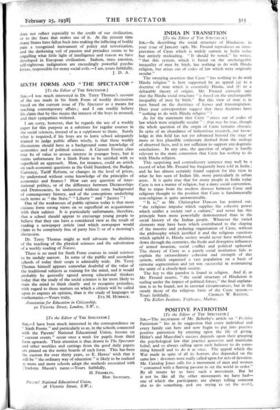INDIA IN TRANSITION
[To the Editor of THE SPECTATOR.] SIR,—In describing the social structure of Hinduism, in your issue of January 14th, Mr. Freund reproduces an inter- pretation of Caste which is widely current in India today but entirely misleading. " It should be noted," he writes, " that this system, which is based on the unchangeable inequality of men by birth, has nothing to do with Hindu religion, but arises out of codes of law which were originally secular."
The sweeping assertion that Caste " has nothing to do with Hindu religion " is here supported by an appeal (a) to a doctrine of man which is essentially Hindu, and (b) to a debatable theory of origins. Mr. Freund correctly says that the Hindu social structure " is based on the unchangeable inequality of men by birth." But this view of man is in turn based on the doctrines of karma and transmigration. Does your correspondent suggest that these doctrines have " nothing to do with Hindu religion " ?
As for the statement that Caste " arises out of codes of law which were originally secular " : that may be true, though the whole question of the origin of Caste remains obscure. In spite of an abundance of industrious research, our know- ledge in this field has not yet advanced beyond the stage of more or less plausible conjecture derived from the analogy of observed facts, and is not sufficient to support any dogmatic conclusions. In any case, the question of origins is hardly relevant to the main contention that Caste has nothing to do with Hindu religion.
This surprising and contradictory sentence may well be a record of what Mr. Freund has frequently been told in India ; and he has almost certainly found support for this view in what he has seen of Indian life, more particularly in urban areas. It is quite true that for many people in India today Caste is not a matter of religion, but a mere social convention. But to argue from the modern divorce between Caste and religious thought to the position that Caste is fundamentally non-religious is quite unwarrantable.
" It is," as Mr. Christopher Dawson has pointed out, " the religious impulse which supplies the cohesive power which unifies a society and a culture," and never has this principle been more powerfully demonstrated than in the social history of the Indian people. Whatever the varied elements may have been which contributed to the shaping of the massive and enduring organisation of Caste, without the philosophy which justified it and the religious sanctions which upheld it, Hindu society would never have withstood, down through the centuries, the fissile and disruptive influences of armed invasion, social conflict and political- upheaval. The theory of Caste as a purely social institution fails to explain the extraordinary cohesion and strength of this system, which organised a vast population on a basis of extreme segmentation and yet was successful in maintaining the unity of a closely-knit society.
The key to this paradox is found in religion. And if, as Mr. Freund asserts, " the social structure of Hinduism is reeling under the impact of political forces," the final explana- tion is to be found, not in external circumstances, but in the steady decay of the religious basis of the Caste system.—
















































 Previous page
Previous page